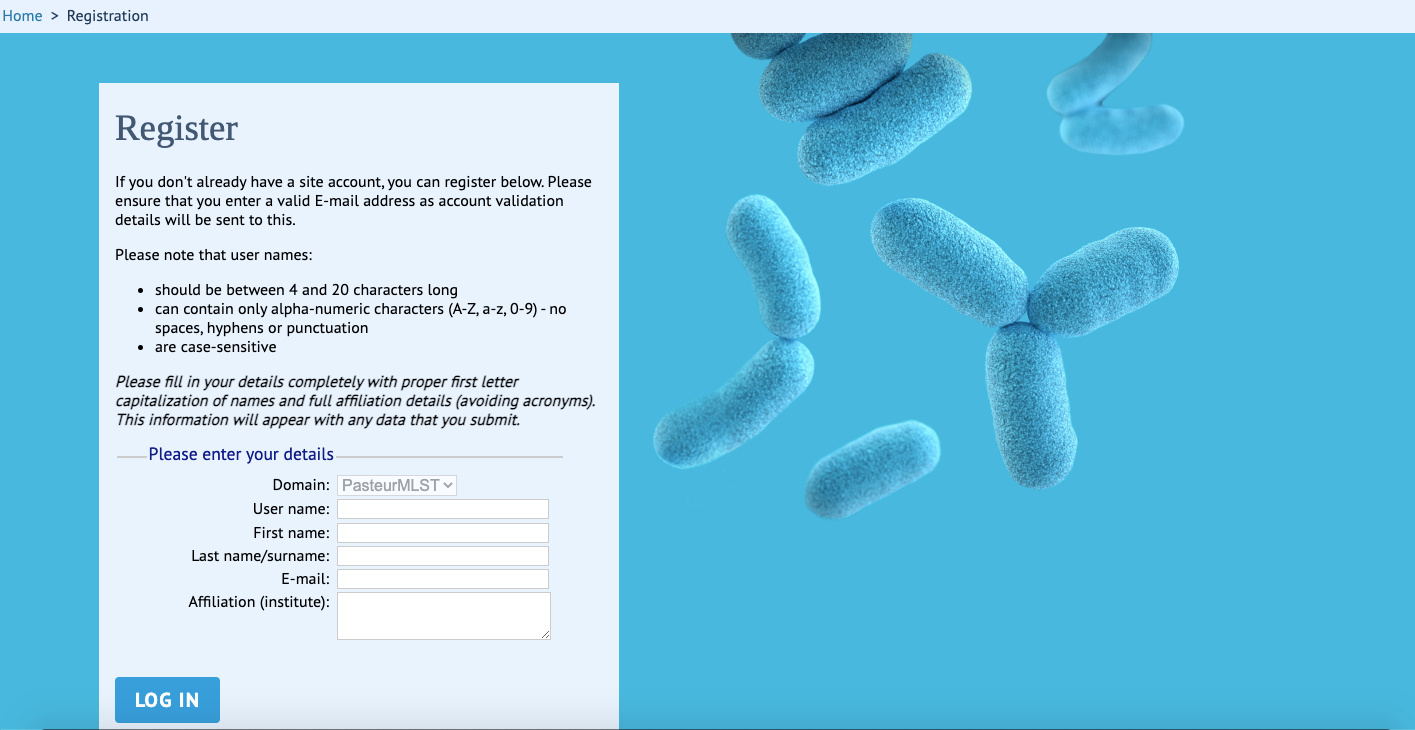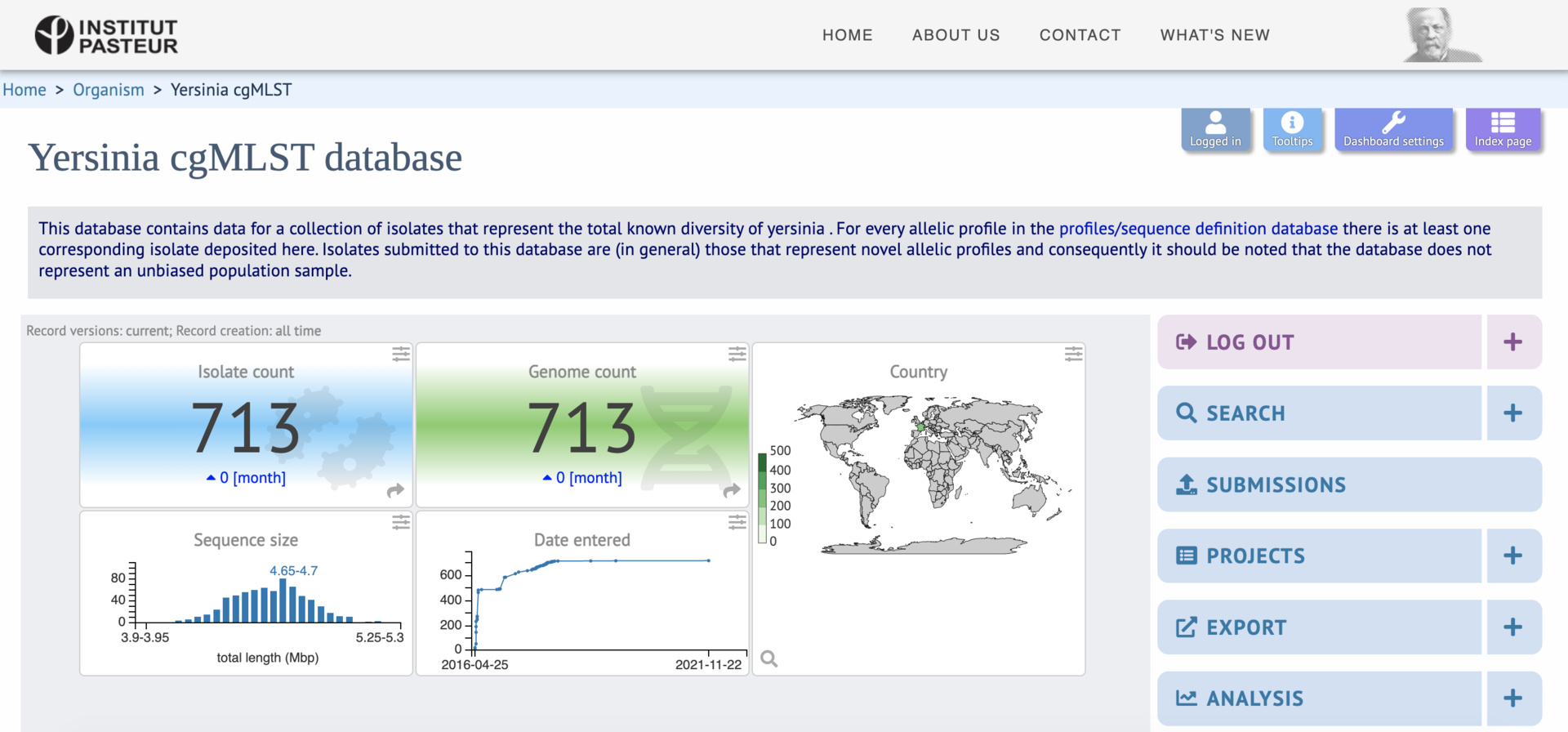Data access policy note: since January 1st, 2025, registration and authentication are mandatory to access all data curated after this date, either via the web interface or via the application programming interface (API authentication help link).
To request an API key, follow the steps outlined at: Requesting a BIGSdb-Pasteur API Key
Please contact us if you have any questions.
Getting an account
If you do not have an account yet, please create a new account thorough the site Register for a site-wide account and register your account with the database where you wish to submit data via the automated submission system. If you already have an account associated with a database, you can reset your password, update your profile and register your account with specific databases in the site-wide account settings page.
Please ensure that you enter a valid E-mail address as account validation details will be sent to this. Please fill the box with your complete details using proper first letter capitalization of names and full affiliation details, i.e. department, institution, country (avoiding acronyms). This information will appear with any data that you submit.

Submissions
Please submit all data (isolate’s records and sequence data) for allele and profiles definitions through your BIGSdb-Pasteur submitter account. Once your submission is completed, you and the curators will automatically receive a notification.
Users are requested to submit only high-quality sequences, generated from pure cultures sequenced at a minimum coverage of 40X. Assembly files consisting of highly fragmented contigs (> 1000 contigs or N50 < 20K) or presenting a cumulative contigs length outside the typical range of Yersinia species (4-5.5Mb) will not be accepted. Submissions containing low quality assemblies may be entirely rejected.
Once logged into the Isolates and genomes database, click on SUBMISSIONS to access the submission panel. Choose genomes to provide the isolate information (use the template available there) and assembly files (closed or draft genomes in FASTA format). A guidance note is available in the headers of the template to help you to fill-out the metadata fields. Please label your assembly files exactly as the assembly_filename of the template and in accordance to the isolate name. For example, if the isolate name is ATCC13883 in the template, the assembly file should be ATCC13883.fas. The suffixes .fa, .fasta or .fna are also acceptable.

Data release
We encourage submission of all isolates of your studies, so that the database would be as representative of the natural populations as possible. Thus, please do not restrict yourself to submitting only isolates that represent new profiles: isolates with already known MLST types are valuable as well.
We also encourage immediate release of your isolates provenance data and genomic sequences. However, in the case you would like to ask for an embargo period (e.g. prior to publication), please specify it to the curators in the submission request mail. Data release should ideally be when your publication is accepted or no later than one year after submission to our database. Curators may automatically submit your data to the public database after this period. You will be notified and asked to control if all data integrated in the BIGSdb database are correct. We kindly ask you to inform us in the case of data publication or metadata rectifications to allow us to keep current records updated.
Acknowledgments
Curation and maintenance of BIGSdb-Pasteur databases is performed on a voluntary basis by a handful of colleagues, who dedicate their time to the community.
We appreciate if you can recognize our efforts in the acknowledgments section of your publications:
We thank the Institut Pasteur teams for the curation and maintenance of BIGSdb-Pasteur databases at http://bigsdb.pasteur.fr/.
References
Please quote the original publications on the development of nomenclature schemes from the references page.
Collaboration
For submissions of large amounts of data, or when you would like to request further analyses in addition to curation, we may ask you to add the person of the curator team in charge of analyzing your data among your co-authors.